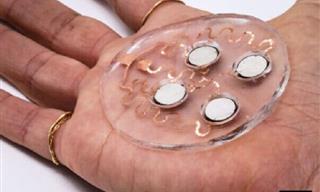Vitamin B6, or pyridoxine, is one of the essential vitamins all people need to stay alive and healthy. Moreover, meeting one’s daily needs of this vitamin was suggested to prevent and treat chronic diseases. The human body cannot produce this vitamin on its own, so we must rely on foods like peanuts, spinach, and chicken to meet our daily dose of pyridoxine.
It’s crucial to eat foods rich in this vitamin on a daily basis because vitamin B6 is water-soluble, which means that it’s flushed out of the body through urine and sweat every day. In this post, we explain how vitamin B6 benefits your health, who is at risk of developing a deficiency, and how to make sure that you’re getting enough pyridoxine.
How vitamin B6 benefits the body
1. Essential for the brain and prevents dementia
Vitamin B6 is essential for the synthesis of several neurotransmitters, including serotonin, dopamine, melatonin, and noradrenaline. Without these chemicals, our brain cannot regulate such important functions as sleep, mood, and our stress response.
But this isn't all. Early research suggests that Vitamin B6 could also help prevent or slow down the development of Alzheimer’s disease. It turns out that B6 can reduce the levels of homocysteine in the blood, which is a blood marker that raises one’s risk of several health conditions, including neurological issues like Alzheimer’s.
In adult patients with mild cognitive issues, for example, taking a B6, B12, and B9 in high doses managed to reduce the decline in a number of brain regions susceptible to Alzheimer’s. Therefore, maintaining adequate levels of vitamin B6 and other B vitamins could prevent cognitive decline.
2. Prevents anemia and keeps your immune system in check
Vitamin B6 plays a key role in the production of blood cells. The vitamin is involved in the synthesis of hemoglobin, the oxygen-carrying protein present in the red blood cells. When the levels of red blood cells or hemoglobin are low, a person develops anemia.
Therefore, vitamin B6 can be effective at preventing and treating anemia in patients with low levels of this vitamin. In one case study, treatment with vitamin B6 helped a 72-year-old woman with anemia that was linked to low pyridoxine levels recover from the condition. In addition to red blood cells, vitamin B6 is involved in the functioning of key immune cells called lymphocytes that help fight off infections.
3. Reduces the risk of heart disease
Remember the pesky homocysteine that shows up in the blood and wreaks havoc in the brain? Unfortunately, the brain is not the only organ it can damage. Homocysteine also increases one’s risk of heart attacks, strokes, cardiovascular issues, and atherosclerosis, so it’s important to make sure that one’s homocysteine levels remain low. A combination of vitamin B6, B12, and folic acid can achieve that goal.
Overall, research shows that people deficient in vitamin B6 are almost twice as likely to suffer from heart disease as those with adequate levels of the vitamin. This suggests that consuming enough Vitamin B6 can help prevent heart disease and protects you from cardiovascular issues.
4. Helps reduce arthritis symptoms
Rheumatoid arthritis increases the levels of inflammation in the body astronomically. According to medical research, these high inflammation levels can reduce the concentration of vitamin B6 in the body. This is why researchers have suggested that increasing one’s intake of B6, be it through diet or supplementation, could reduce the symptoms of the condition.
One medical article involving 43 adults with rheumatoid arthritis provides some early evidence for this. In the study, patients either took 5 mg of folic acid alone or combined the folic acid with 100 mg of vitamin B6. After 3 months of daily supplementation, the levels of inflammation in the group that took both folic acid and B6 were significantly lower.
5. Protects you from depression and improves your mood
As we’ve already mentioned, vitamin B6 is crucial for the production of neurotransmitters such as dopamine and serotonin. If you recognize these two, you’ll likely already know that they are both often referred to as “the happiness hormones” because of their role in reward regulation and mood control. Therefore, you must keep your vitamin B6 levels in check to maintain your emotional health.
In addition to regulating your mood, however, these neurotransmitters are also essential for preventing depression and other mental health conditions. Likewise, several studies provide evidence that insufficient intake and low blood levels of B6 can produce depressive symptoms, especially in seniors. A study that involved 250 seniors suggests, for example, that a B6 deficiency doubles the risk of developing depression. Therefore, the vitamin may have a protective effect against depression.
6. Prevents vision loss
Interestingly, vitamin B6 can also help prevent vision loss, especially in older adults. The vitamin in combination with B12 and folic acid was shown to reduce the risk of age-related macular degeneration (AMD) in a big study spanning over 7 years. Taking this combination of vitamins reduced participant’s risk of AMD by 35–40%.
Also, maintaining healthy levels of B6 can help protect you from retinal disorders, according to another study. So, if you wish to protect your eyesight, definitely consider paying close attention to your B6 intake.
7. Lowers the risk of cancer
Although researchers aren’t sure how vitamin B6 can decrease the risk of cancer, studies show that an adequate intake of vitamin B6 can lower one’s risk of colorectal cancer by as much as 50%. The risk of developing breast cancer in those with normal levels of the vitamin is also much lower, especially in postmenopausal women.
In general, research confirms that B6 is beneficial for women - it’s capable of reducing PMS symptoms and morning sickness in pregnant women, too. Medical researchers suggest that these positive effects may be related to B6’s anti-inflammatory properties.
How much vitamin B6 is enough?
Maintaining adequate vitamin B6 levels is important at any age, but the amount of the vitamin you should consume will vary depending on your gender and age. Here are the recommended daily doses for adults according to the National Institute of Health:
- Adults 50 or younger: 1.3 mg
- Males over 50: 1.7 mg
- Females over 50: 1.5 mg
- Pregnant women: 1.9 mg
- Breastfeeding women: 2 mg.
It needs to be pointed out that the majority of people get enough vitamin B6 from their diet, but some people are more likely to develop a B6 deficiency than others. Seniors, pregnant women, people with certain underlying conditions, those who are overweight, as well as heavy drinkers and smokers are more likely to develop a vitamin B6 deficiency.

Those who are deficient in vitamin B6 will often experience the following symptoms:
- Mood changes
- Tingling in the hands and feet
- You catch colds and respiratory infections more easily
- Skin rashes
- Sore and cracked corners of the lips
- A glossy tongue
- Seizures.
Your doctor will be able to diagnose a possible vitamin B6 deficiency through a blood test and advise you on whether or not you need to take a B supplement. But overall, a healthy diet is the best source of vitamin B6. Here’s a list of foods rich in vitamin B6.
- Canned chickpeas - 1.1 mg in 1 cup
- Peanuts - 0.7 mg in 1 cup
- Salmon - 0.6 mg in 1 serving (85 mg; 3 oz)
- Potatoes - 0.4 mg in 1 cup
- Banana - 0.4 mg in 1 medium-sized fruit
- Chicken - 0.2 mg in 1 serving (100 g; 3.5 oz)
- Low-fat cottage cheese - 0.2 mg in 1 cup
- Soybeans - 0.2 mg in 1 cup
- Oatmeal - 0.1 mg in 1 cup
- Spinach - 0.1 mg in 1 cup
- Watermelon - 0.1 mg in 1 cup
- Orange - 0.1 mg in 1 medium-sized fruit.
As you can see, a wide variety of both plant-based and animal-derived foods contain plenty of vitamin B6. Some foods, such as breakfast cereals, are also fortified with B6. We hope this information will help you maintain a healthy diet.
Share this information with others!
 Go to BabaMail
Go to BabaMail
































